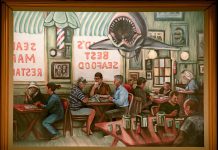“I know I’m not an ordinary 10-year-old kid. I mean sure, I do ordinary things. I eat ice cream. I ride my bike. But I know ordinary kids don’t make other kids run away screaming in the playground …
“I wish that I could walk down the street without people seeing me and then doing that look-away thing. Here’s what I think: the only reason I’m not ordinary is that no one else sees me that way.”
So begins “Wonder,” an endearing new children’s novel by R.J. Palacio. Palacio, a long-time designer of book jackets for other people’s novels who longed to write her own book, finally has with this, her debut effort.
In “Wonder,” we meet August “Auggie” Pullman, and the family members and kids who make up his world. Auggie has a severe facial abnormality, which has caused him to be regarded as “different” his whole life. At the start of the book, he is preparing to enter school for the first time, as a scared and emotionally scarred fifth grader.
As you might expect, life in general – and children in particular – are things that are not kind to someone like Auggie. We fear things that are different from ourselves. We look away, and avoid things that are scary. We don’t always take the time to learn about the things that make differences beautiful.
Palacio set out to write this tale after she and her children had a real-life encounter with a child living with the same facial anomalies as Auggie. After leaving the situation and examining both the behavior of her children and herself, she realized how difficult life must be when you are deemed unsavory simply for the way you look. She realized that those we classify as “different” often really aren’t, and set out to prove it through this incredibly relatable tale.
She does more than just teach us to accept, however. She shows us through the eyes of children, and the obstacles they encounter, how very much kindness counts. Throughout the book, we encounter all the people in Auggie’s world – the kids and adults who are kind to him because they “should be,” and those who are genuine. We meet the ones who don’t even try to be kind, and those who are outright cruel, and we see how the actions of these people affect not only Auggie, but also themselves.
Auggie was fortunate to have several adults in his life who believed in him, and worked extra hard to help him achieve his potential. One of these individuals was Mr. Browne, the English teacher, who each month highlighted an important precept he would like his students to consider, and encouraged them to find their own precepts as well.
Many of Mr. Browne’s precepts for the year had to do with being kind and doing good, but I especially appreciated the precept for April, “What is beautiful is good, and who is good will soon be beautiful.” This quotation from Sappho says it all – what makes us beautiful isn’t our face, or hair, or athletic ability, or bank account. Who we are inside, and the way we live our lives are the things that define us and make us beautiful.
Kind actions and gentle ways can transform anyone into a beauty to rival all others. As the school year closes, the school director leaves the students, and us, with this thought:
“The best way to measure how you’ve grown isn’t by inches, or the number of laps you can now run around the track, or even your grade point average – though those things are important to be sure.
“It’s what you’ve done with your time, how you’ve chosen to spend your days, and whom you have touched this year. That to me is the greatest measure of success.”




